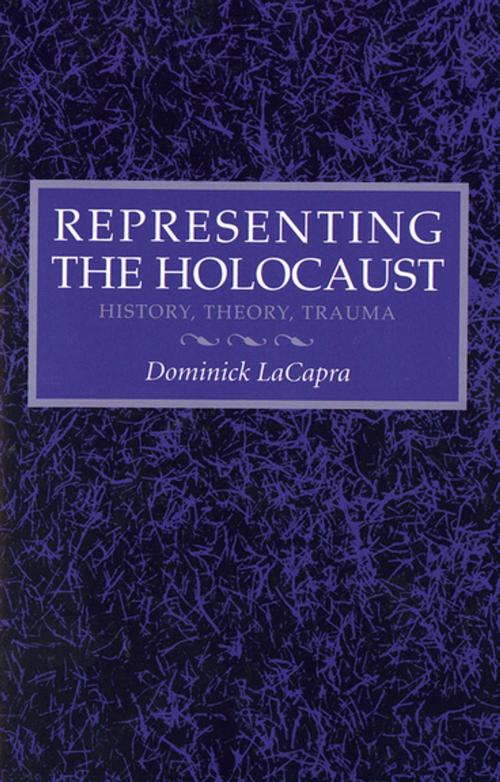Representing the Holocaust
History, Theory, Trauma
Nonfiction, History, Jewish, Holocaust, Social & Cultural Studies, Social Science| Author: | Dominick LaCapra | ISBN: | 9781501705076 |
| Publisher: | Cornell University Press | Publication: | November 1, 2016 |
| Imprint: | Cornell University Press | Language: | English |
| Author: | Dominick LaCapra |
| ISBN: | 9781501705076 |
| Publisher: | Cornell University Press |
| Publication: | November 1, 2016 |
| Imprint: | Cornell University Press |
| Language: | English |
Defying comprehension, the tragic history of the Holocaust has been alternately repressed and canonized in postmodern Western culture. Recently our interpretation of the Holocaust has been the center of bitter controversies, from debates over Paul de Man's collaborationist journalism and Martin Heidegger’s Nazi past to attempts by some historians to downplay the Holocaust’s significance. A major voice in current historiographical discussions, Dominick LaCapra brings a new clarity to these issues as he examines the intersections between historical events and the theory through which we struggle to understand them.In a series of essays—three published here for the first time—LaCapra explores the problems faced by historians, critics, and thinkers who attempt to grasp the Holocaust. He considers the role of canon formation and the dynamic of revisionist historiography, as well as critically analyzing responses to the discovery of de Man’s wartime writings. He also discusses Heidegger’s involvement with National Socialism, and he sheds light on postmodernist obsessions with such concepts as loss, agora, dispossession, deferred meaning, and the sublime. Throughout, LaCapra demonstrates that psychoanalysis is not merely a psychology of the individual but that its concepts have sociocultural dimensions and can help us perceive the relationship between the present and the past. Many of our efforts to comprehend the Holocaust, he shows, continue to suffer from the traumatizing effects of its events and require a "working through" of that trauma if we are to gain a more profound understanding of the meaning of the Holocaust.
Defying comprehension, the tragic history of the Holocaust has been alternately repressed and canonized in postmodern Western culture. Recently our interpretation of the Holocaust has been the center of bitter controversies, from debates over Paul de Man's collaborationist journalism and Martin Heidegger’s Nazi past to attempts by some historians to downplay the Holocaust’s significance. A major voice in current historiographical discussions, Dominick LaCapra brings a new clarity to these issues as he examines the intersections between historical events and the theory through which we struggle to understand them.In a series of essays—three published here for the first time—LaCapra explores the problems faced by historians, critics, and thinkers who attempt to grasp the Holocaust. He considers the role of canon formation and the dynamic of revisionist historiography, as well as critically analyzing responses to the discovery of de Man’s wartime writings. He also discusses Heidegger’s involvement with National Socialism, and he sheds light on postmodernist obsessions with such concepts as loss, agora, dispossession, deferred meaning, and the sublime. Throughout, LaCapra demonstrates that psychoanalysis is not merely a psychology of the individual but that its concepts have sociocultural dimensions and can help us perceive the relationship between the present and the past. Many of our efforts to comprehend the Holocaust, he shows, continue to suffer from the traumatizing effects of its events and require a "working through" of that trauma if we are to gain a more profound understanding of the meaning of the Holocaust.















